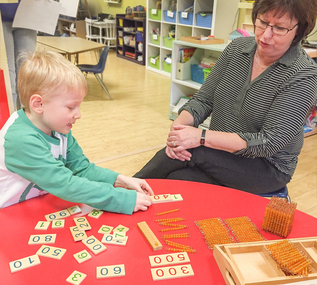|

Tailor-made teaching
How do you define differentiated instruction? I would say it goes back to the fundamental philosophy that every child gets to learn something new at school every day. Giving every child equal access to education means you need to do different things for different children. Isn’t that just common sense? Not always. Some systems in schools are set up to say that every kid should hit the same academic milestones in same way at the same time. We don’t expect children to hit growth charts like that. We don’t expect their T-ball skills to develop like that. Why do we expect their reading or math or other academic skills to develop like that? How do we ensure differentiation happens at Seabury? At Seabury, we have small classes and highly trained teachers in order to be able to appropriately challenge every single child, every single day. Because most gifted kids are not equally gifted in every area. They have strengths and weaknesses like everyone else. Although our classes are small, the range of needs is extremely wide. What might that look like in one of our classes? In a first-grade class, we might find students whose reading hasn’t really clicked yet, where they’re still struggling to sound out words, but who also have highly advanced comprehension skills when they hear a story read. Other children might be reading chapter books meant for fifth or sixth graders, and yet only have five or six years of life experience so while they “understand†what they are reading, they don’t comprehend like an older student would. It makes the range of abilities in any class wide. And they’re all still gifted. How does a teacher address this? What it means in a first-grade reading class is that kids who are not decoding well need to be stretched in decoding, while still being offered materials that allow them continue to stretch their already high level of comprehension. With the early readers, Seabury teachers know that they usually start reading spontaneously without relying on phonics, so the teachers work with them to notice things like patterns that they haven’t been exposed to. They don’t need phonics to be able to sound out words, but understanding word patterns will help with spelling and vocabulary development. Read more at Seabloggery |
In This IssueUpcoming EventsApril 20th May 30th June 7th |
Seabury School
|
Elementary Campus
1801 53rd Street NE |
Middle School Campus
925 Court C |
|
Having trouble reading this email? View it in your browser. Not interested anymore? Unsubscribe. You\'re receiving this email because you are a subscriber to the Seabury School newsletter. |
||

